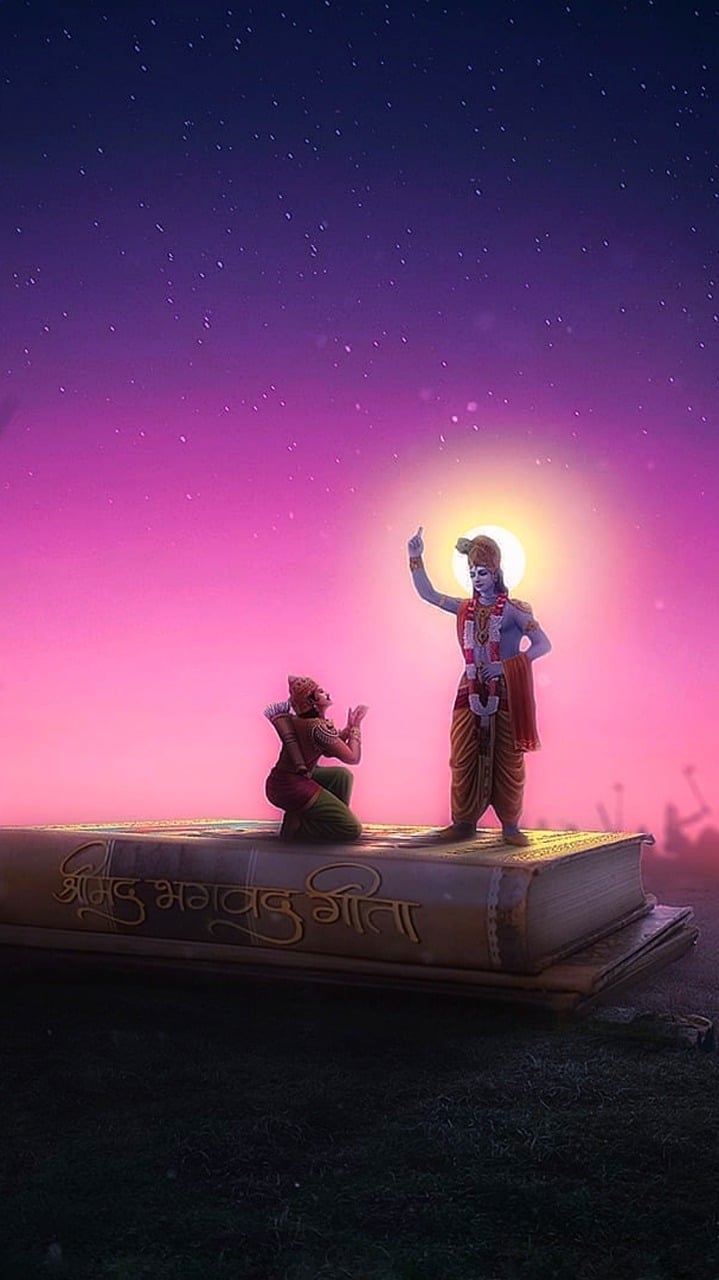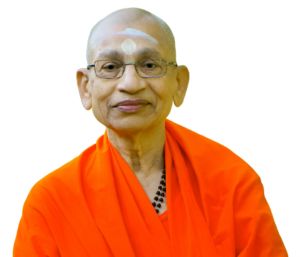
Spiritual Discourses: What does Lord Krishna mean by “my” and “I”?
By Swami Viditatmananda Saraswati*
Na Me Bhaktaḥ Praṇaśyati – 02
What does Lord Krishna mean by “my” and “I”?
Lord Krishna says, “My” devotee does not get destroyed. Whose devotee? Me means “my, mine,” which is a modification of the first-person pronoun “I.” It is said that in the whole of the Gita, Lord Krishna uses the pronoun “I” or its declensions or modifications 108 times. In what sense does Lord Krishna use the pronoun “I”? What does he mean by “I”?
When Lord Krishna says, “sarvadharmān parityajya mām ekaṁ śaraṇaṁ vraja, giving up all your agenda may you take refuge in me alone,” who is that “me?”
Different ācāryas, teachers, have different opinions about what Lord Krishna means by “I” in the Bhagavad Gita. There is a whole tradition that the Bhagavad Gita teaches us to worship Lord Krishna who appeared in human form, having two arms and the flute in hand. Another ācārya says that the Bhagavad Gita teaches us to worship Nārāyaṇa, the śaṅkha-cakra-gadā- padma-dhārī, having four arms that carry the conch, discus, mace, and lotus. Another ācārya says that the Bhagavad Gita teaches us to worship the Lord in the cosmic form, who is the self of all.
In the eleventh chapter, Arjuna requests Lord Krishna to show him his cosmic form. Because Arjuna was a devotee, Lord Krishna showed it to him. At first, Arjuna was very excited and began describing what he saw. But he found that gradually the cosmic form was turning into a very terrifying form. He was terrified because the Lord as though presented himself as nothing but the embodiment of death, and he was devouring everything. The armies of Kauravas and Pāṇḍavas were walking into his mouth and he was devouring them.
Arjuna was scared and asked Lord Krishna to please fold up this form. “Tenaiva rūpeṇa caturbhujena sahasrabāho bhava viśvamūrte. Sahasrabāhu, O Lord with thousands of arms; viśvamūrte, who has taken all the forms in the cosmic form; tenaiva rūpeṇa caturbhujena, please appear before me in your form with four arms.” Arjuna wanted to see Lord Krishna in the form of Viṣṇu, Nārāyaṇa, having four arms. Later in the chapter, Arjuna asks to see “mānuṣaṁ rūpaṁ tava saumyam, your pleasing human form,” meaning the form of Lord Krishna with two arms.
With all of these forms occurring within the Bhagavad Gita, the question is, which is the form that Lord Krishna means for us to worship? What does Lord Krishna mean when he says “my” devotee?
Lord Krishna is īśvara, the one limitless self
The Vedāntin says that Lord Krishna means paramātmā, the self of all. Lord Krishna does not use the pronoun “I” as a person and not even as a specific form such as Nārāyaṇa. He means “I” that is the universal “I.” “I” means the self and the self happens to be one.
The self is not many, although it looks as though we are all different from each other. You and I are different from each other and everyone else is different from us, so how many ātmās are there? How many selves are there? It looks like your ātmā is different, her ātmā is different, my ātmā is different, the mosquito’s ātmā is different, and so on. It appears that there are as many ātmās as there are living beings, and that is what some people say.
The Vedāntin says no, ātmā is one; the self is one. When we see so many beings, how can it be that ātmā is only one? Just as light bulbs are many, the electricity that lights them is one, similarly, the bodies are many but the self that is manifesting through those bodies is one. The ultimate meaning of the pronoun “I” is the universal self, the self of all. It is the limitless self. As the Śvetāśvatara Upaniṣad says, “eko devaḥ sarvabhuteṣu gūḍhaḥ, one devatā, the one self-effulgent Lord, abides in all the beings.”
When Lord Krishna uses the pronoun “I,” he means īśvara. When he says “My devotee never perishes,” he means the devotee of īśvara. Who is xi? That is answered in the middle six chapters of the Bhagavad Gita. Chapters seven through twelve are devoted to unfolding the nature of īśvara. There, Lord Krishna himself describes who he is. He says, “mattaḥ parataraṁ nānyat kiñcidasti dhanañjaya,1 O Arjuna, in this universe there is nothing other than me.” There is nothing besides me; nothing superior to me; nothing inferior to me; nothing other than me. All there is, is I. That is the īśvara we are talking about, whose devotee we should become to gain true success in life.
Freedom from limitation is the goal of life
All this discussion will become meaningful to us provided we first understand what it is that we want in life. Perhaps we have never given a thought to that, or perhaps we have asked such questions as, “Why has God created us? Is there a purpose in life?”
The first question to consider is, “Do we want something in our life?” That there is a purpose is indicated by the fact that we are constantly desiring one thing after the other. A desire arises, we exert effort to fulfil that desire, we are satisfied momentarily, and then another desire arises. We again make an effort and that desire is satisfied, again producing momentary satisfaction, after which a new desire arises. We see that, despite fulfilling desires, there does not seem to be satisfaction within ourselves. Why, despite achieving so much in life, do the desires still keep on arising? Everyone has accomplished something or another in terms of wealth, name, and fame, and still, we do not feel that we are accomplished. Still, something more or something else is needed. Our experience shows that fulfilling desires does not seem to create any lasting satisfaction.
Then the next question is, “What are we seeking, what is it that we want?” Vedanta teaches us that what we want in life, what we are seeking, is to be free from desire. Every desire is an expression of some need, some want, or some lack. Therefore, freedom from desire means that we want freedom from lack, freedom from want, and freedom from limitation. We want to be limitless. We want to be a whole and complete being.
Sometimes, when some desire is satisfied or some good thing happens, we feel ecstatic. At that moment of ecstasy, there is satisfaction in our mind and we do experience that wholeness or fullness. We have these moments of satisfaction when we experience freedom from wanting and lacking, but that feeling goes away. That is the feeling we all want to create all the time, but we find it only temporarily.
Therefore, what human beings want is everything, meaning that we want no lack, no want. We want wholeness, completeness, limitlessness. Vedanta says that is what we are. Na me bhaktaḥ praṇaśyati. Lord Krishna promises that my devotee does not get ruined. We do not want to be ruined; we want to always be, meaning that we want to be immortal. We want to be limitless. We want to be infinite. We want to be complete. That is what we want and that is the goal of life.
…to continue
*Swami Viditatmananda Saraswati has been teaching Vedānta Prasthānatrayī and Prakaraṇagranthas for the last 40 years in Ahmedabad, Gujarat. Throughout the year, he conducts daily Vedānta discourses, accompanied by retreats, and Jñāna Yajñas on Vedānta in different cities in India and foreign countries.







Good presentation